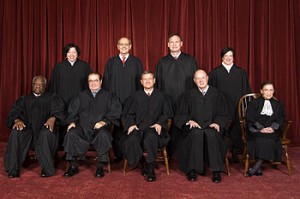 In what may have been the final assault on class-action arbitration waivers, the United States Supreme Court ruled yesterday that the Federal Arbitration Act (“FAA”) does not permit courts to invalidate arbitration agreements on the ground that they do not permit class arbitration of a federal-law claim. Although the decision was brief, the reach of the Supreme Court’s opinion will be wide-sweeping. Contracts that require that parties arbitrate claims, even federal claims, can expressly limit such arbitration proceedings to individual claims, no matter how costly the process may be. Accordingly, we take this opportunity to remind online merchants and marketers of the importance of including class-action arbitration waivers in any and all website Terms and Conditions of use.
In what may have been the final assault on class-action arbitration waivers, the United States Supreme Court ruled yesterday that the Federal Arbitration Act (“FAA”) does not permit courts to invalidate arbitration agreements on the ground that they do not permit class arbitration of a federal-law claim. Although the decision was brief, the reach of the Supreme Court’s opinion will be wide-sweeping. Contracts that require that parties arbitrate claims, even federal claims, can expressly limit such arbitration proceedings to individual claims, no matter how costly the process may be. Accordingly, we take this opportunity to remind online merchants and marketers of the importance of including class-action arbitration waivers in any and all website Terms and Conditions of use.
American Express Co. v. Italian Colors Restaurant
In American Express Co. v. Italian Colors Restaurant, the plaintiffs commenced a class action lawsuit against American Express, alleging that American Express used its monopoly power in the market for charge cards to force merchants to accept credit cards at rates approximately 30% higher than the fees for competing credit cards. Pursuant to the arbitration clause contained in American Express’ merchant agreements, American Express moved to compel arbitration under the FAA. The class-action plaintiffs opposed the motion, insisting that while the maximum recovery for an individual plaintiff would be, at most, $38,549.00, the cost to retain an expert to prove such a claim might exceed $1 million. Despite this cost disparity, the United States Supreme Court rejected the “effective vindication” rule and held that so long as a party’s right to pursue statutory remedies is not obstructed, the fact that pursuing such a claim is not worth the expense involved in proving a statutory remedy does not constitute the elimination of the right to pursue that remedy.
Importance of Class-Action Waivers in Arbitration Agreements
Increasingly, businesses have been including mandatory arbitration provisions with class-action waivers in their agreements. These waivers are effective in reducing both the costs associated with litigation and the potential recovery of prospective plaintiffs. Furthermore, as the American Express case demonstrates, the additional benefit of class-action waivers in mandatory arbitration provisions is that it imposes one extra hurdle for prospective plaintiffs to overcome. Class-action litigation can be daunting to defend, especially because most class-action plaintiff’s attorneys do not bill hourly, and instead profit if they are able to obtain a judgment or settlement on behalf of the class. This increases the amount of money defendants must spend in resolving such class-action litigation. Providing a class-action waiver in an arbitration agreement forces plaintiffs to litigate claims individually and protects defendants from, among other things, the exorbitant attorneys’ fees which tend to accompany class-action litigation.
If you are interested in learning more about this topic or if you would like to discuss the inclusion of mandatory arbitration clauses in your website Terms and Conditions or other agreements, please e-mail us at info@kleinmoynihan.com or call us at (212) 246-0900.
The material contained herein is provided for informational purposes only and is not legal advice, nor is it a substitute for obtaining legal advice from an attorney. Each situation is unique, and you should not act or rely on any information contained herein without seeking the advice of an experienced attorney.
Attorney Advertising



